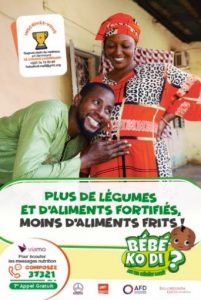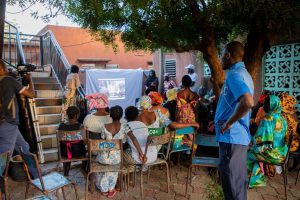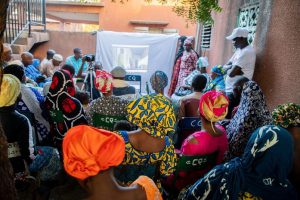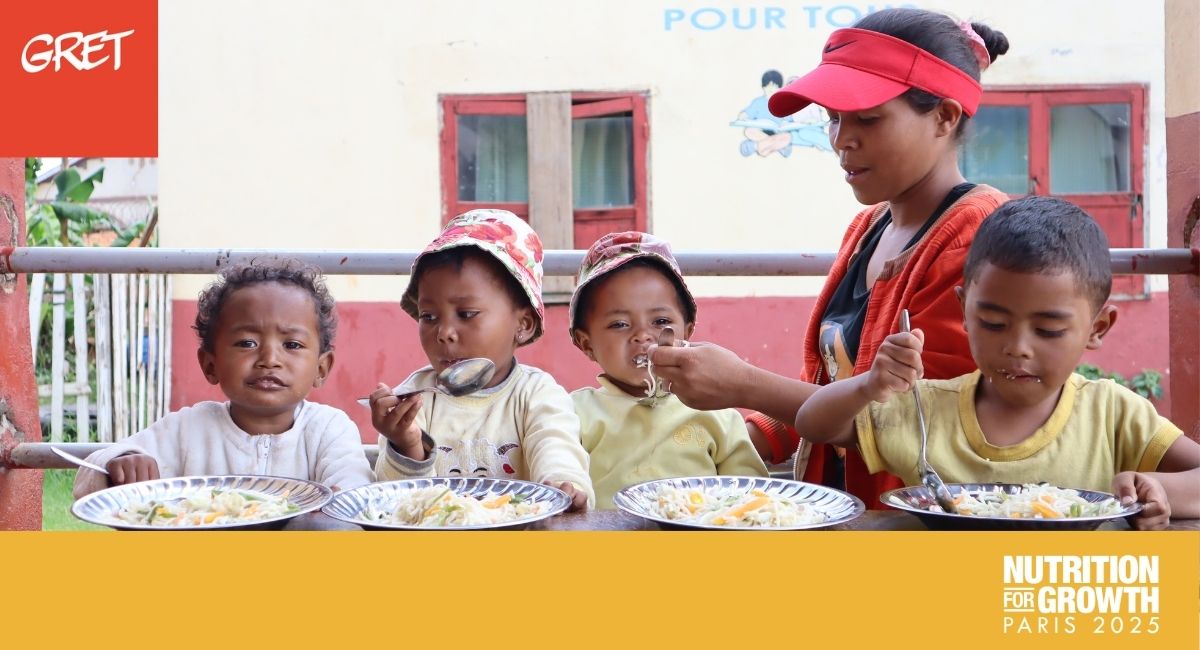In Burkina Faso and Mali, precarious neighbourhoods in peri-urban areas are still experiencing very high levels of malnutrition, particularly among pregnant and breastfeeding women and young children. To respond to these major public health challenges, the Meriem project, conducted by GRET in partnership with a coalition of stakeholders made up of professionals from NGOs, research and private sector consulting, is testing innovative marketing solutions with Sahelian businesses.
Led by GRET and the Malian and Burkinabe Ministries of Health, the Bébé Kodi social communication campaign – carried out as part of the Meriem project – is conveying messages to prevent malnutrition problems in pregnant and breastfeeding women, and promoting consumption of quality fortified foods as part of a healthy, balanced diet.
Baby says: “More vegetables and fortified foods, less fried foods”!
This is one piece of advice given by the baby star from the “Bébé kodi” (“Baby says what”) awareness-raising campaign spots. The baby reacts directly from its mother’s womb to the nutritional advice given by a midwife to its parents. It is on this original, playful tone that a nationwide social communication campaign for behavioural change was launched in Mali in November 2020. A month later, a similar campaign was launched in Burkina Faso.
These two innovative, unprecedented campaigns stand out for their multi-channel approach, simultaneously mobilising the media, cell phones, social networks, and outreach activities. This strategy maximises the impact on the women and men targeted, to improve knowledge and foster widespread adoption of recommended practices.
These two campaigns aim to implement a range of activities to promote a clear message: during pregnancy and breastfeeding, eating a varied, balanced diet is essential for the health of mothers and their children.
Under the auspices of the Burkinabe and Malian Ministries of Health, in partnership with GRET as part of the Meriem project, these two campaigns are being implemented for a period of three to four months. They were developed with the help of local communication agencies, and the involvement of a key project partner, the Ogilvy communication agency.

Baby tells us more
In the two Sahelian capitals, various forms of malnutrition exist: under-nutrition, micronutrient deficiencies, excessive weight and obesity. In Mali and Burkina Faso, anaemia, generally caused by iron deficiency, affects 63 % and 49 % respectively of women of childbearing age (aged 15 to 49). In the Bamako region in Mali, more than 40 % of women of childbearing age are overweight. In Burkina Faso, only 19.4 % of women of childbearing age have a varied diet.
Yet, the nutritional status of future mothers has a direct impact on that of children and the consequences of child malnutrition are irreversible, as they impact the health of young children and therefore future adults, both physically (delayed growth, poor health) and cognitively (learning difficulties, etc.). The fight against maternal malnutrition is therefore one of the keys to preventing the intergenerational cycle of malnutrition.
These campaigns support the marketing and promotion of local fortified foods for pregnant and breastfeeding women because, for Martial Pouret, director of the Meriem project, “these products are only effective to fight against malnutrition if they are part of adequate amounts of an appropriate, varied diet. Widespread dissemination of information on an appropriate diet makes it possible to create an environment that fosters knowledge, understanding and consumption of fortified products”.
These two social communication campaigns also aim to generate greater awareness among men, who are generally not very aware of the major support role they have to play in their wives’ nutrition and health. As the baby says, “Get it, dads?”.
Baby takes us on a guided tour of activities
The campaign messages are disseminated via numerous complementary media in short, pragmatic messages: “less sweets, more water“. Sandrine Guissou and Maïmouna Diakité, GRET’s two awareness-raising officers in Burkina Faso and Mali, explain that “the objective is to broadcast the same messages simultaneously through different communication channels for greater credibility. In this way, the messages are widely shared and discussed, which maximizes their chances of being memorised and put into practice.”
Film-debate sessions in neighbourhoods and health centres in the two capitals are organised by local associations supported by GRET. Films created especially for the campaigns are shown to small groups of pregnant and breastfeeding women and their husbands, separately or as a couple. These screenings initiate rich exchanges on dietary practices. “[…] the well-being of children cannot be ensured without the support of both parents, it is up to both parents to ensure the evolution of the pregnancy and motherhood. I learned a lot today. …] I am appealing to all men to become aware,” said one father at a film-debate in the Torokorobougou district of Bamako.
WhatsApp mailing lists will also be created with film-debate participants to share films, campaign messages, and encourage peer-to-peer sharing.


The mobilisation of participants in the film-debates is facilitated by influential people in the neighbourhoods (neighbourhood leaders, imams, representatives of local associations, and health workers) who themselves sometimes act as spokespersons for the campaign messages.
Short versions of the films shown at the film-debates were also broadcast on national and local TV channels and interactive radio programmes were organised. In Mali, a mini-series was created and broadcast, with 3 one-minute episodes each. Viewers can follow the parents’ adventures and identify with them. You can watch these on the Bébé Kodi YouTube channel, and see the Burkina Faso spot here.
In Burkina Faso, talented and committed slam artist Malika la slameuse agreed to be an ambassador for the awareness campaign. “The well-being of future generations is at stake,” she says in one of her posts relaying the activities of the campaign on her Facebook page. She composed a special slam on the concepts of a balanced, varied diet, which is very popular and enables a larger target audience to be reached, given that she is a prominent celebrity in Burkina Faso.

Lastly, mobile telephony also makes it possible to massively sensitize the population through the Viamo service in Mali and the AlloLaafia service in Burkina Faso. The latter enables personalised advice to be sent via text message to pregnant and breastfeeding women on their diet and recommended care. The subscription, which is free, is also offered to pregnant and breastfeeding women’s husbands.







